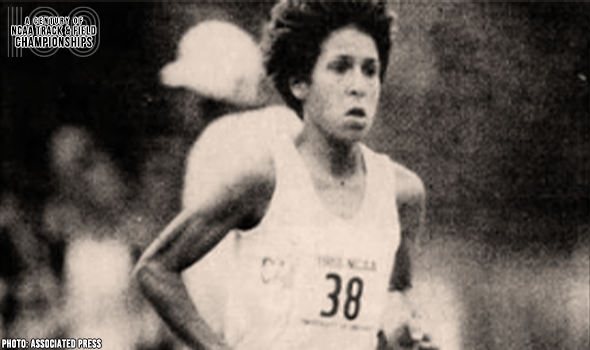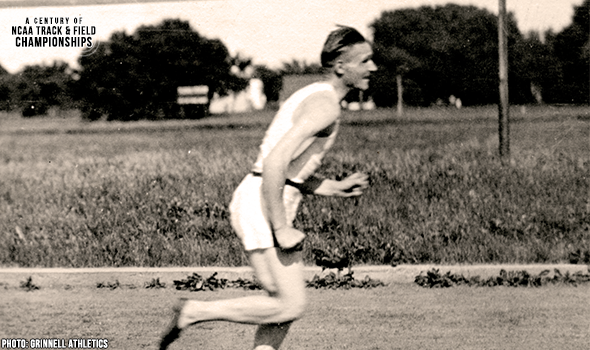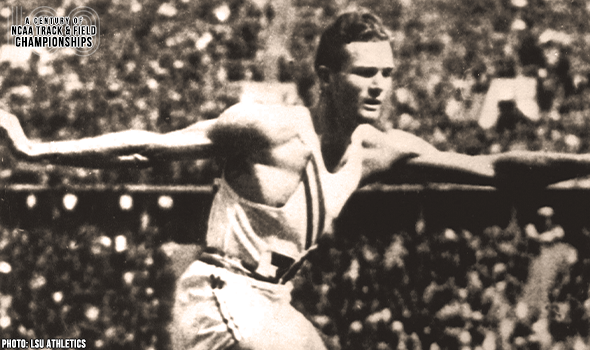
Mosqueda’s 10K Record Caps Incredible Year
November 21, 1987
Sylvia Mosqueda of Cal State Los Angeles won the individual title at the 1987 NCAA Division II Cross Country Championships in Evansville, Indiana, by 24 seconds in 16:57. That remained the largest margin of victory in meet history until seven years later.
May 1, 1988
Sylvia Mosqueda set a blistering pace at the U.S. Women’s Olympic Marathon Trial in Pittsburgh, Pennsylvania. She opened up a 1½-minute advantage through five miles and continued to lead through 17 miles before dropping out not long after. It was noted by Christine Brennan in the Washington Post that “(Eventual winner) Margaret Groos and the others completely lost sight of Mosqueda along some stretches of the hilly, tree-lined course.” (Mosqueda was pulled out of the race by her coach after noticing her toes had ripped through her shoes, which rubbed her feet so raw that her socks filled with blood.)
June 1, 1988
Sylvia Mosqueda, still just days after recovering from a two-week battle against chicken pox and the flu, dominated the 10,000-meter final at the NCAA Division I Outdoor Track & Field Championships at Hayward Field in Eugene, Oregon. She took the lead with 21 laps to go and pushed the tempo on her way to a 16-second win, as well as the collegiate record and meet record of 32:28.57.
“The night before the race, my coach (Gudrun Armanski) took me out to the track and told me, ‘You can be champion, if you want,’” Mosqueda recalled to the USTFCCCA earlier this month. “I don’t know if I truly believed him, but I trusted my training. Our game plan was to run the first mile in 5:10 and then do whatever I wanted to from that point on.”
“I wish somebody would have recorded it on video. Now that I’m 54-years old, that race has always stood out in my mind. I can close my eyes and envision the entire 10,000 — just as it was. I would love to know if it looked that way to everybody else, too.”
Mosqueda, who enters her second year as head coach of the cross country and track & field programs at Pepperdine University in 2020, saw her records last for quite a few years.
The collegiate record of 32:28.57 held strong until 1994 when Carole Zajac of Villanova went 32:22.97 at the Penn Relays, while her all-time best at the NCAA final site remained atop the chart for 24 more years after that.
Back in 2018, Sharon Lokedi of Kansas led a squadron of sub-32:30 women at Hayward Field. Lokedi won the NCAA title in a 32:09.20 MR and five other women dipped under Mosqueda’s mark as well: Dorcas Wasike of Louisville – 32:11.81; Karissa Schweizer of Missouri – 32:14.94; Alice Wright of New Mexico – 32:17.92; Charlotte Taylor of San Francisco – 32:17.95; Anna Rohrer of Notre Dame – 32:26.24.
The NCAA and collegiate track & field will mark a momentous milestone in the spring of 2021 -- the 100th anniversary of the NCAA Championships and with that, the NCAA Track & Field Championships. In June 1921, the University of Chicago hosted the first track & field championships in NCAA history.
This point can’t be emphasized enough: Not only was the event the first for NCAA track & field, but the first championships for any sport under the sponsorship of the NCAA.
To celebrate, over each of the next 365 days, the U.S. Track & Field and Cross Country Coaches Association (USTFCCCA) will celebrate moments, student-athletes, and coaches that have made a century’s worth of championships special. From humble beginnings to important historical milestones to the modern-day, collegiate track & field has evolved with the American society.
The 2021 edition of the NCAA Division I Outdoor Track & Field Championships begin with preliminary round action on May 27-29 in Jacksonville, Fla., and College Station, Texas. The championships final site and culmination of the celebration is slated for June 9-12, 2021 at the newly rebuilt Hayward Field in Eugene, Ore.

SIU’s Roggy Dominated The Javelin In 1978
Bob Roggy won the javelin title at the 1978 NCAA DI Outdoor T&F Championships by more than 20 feet. Roggy qualified first for the final with a MR heave of 89.30m (293‑0).

Makusha Made History In Bowerman Year Of 2011
Ngoni Makusha became just the fourth man in meet history to win individual titles in both the 100 and LJ. It was his 3rd career LJ crown and he set a CR in the 100 of 9.89.

George Mason’s Gage Shocked The NCAA LJ In 1988
Nena Gage won the long jump at the 1988 NCAA DI Outdoor T&F Championships in a shocking upset over Gail Devers.

Texas’ Thompson Marveled In NCAA Distance Events
Jerry Thompson won three career distance titles at the NCAA Outdoor T&F Championships. His first came in 1943. Then he won again in 1947 & 1948 after serving in World War II.

Grinnell’s Paulu Sprinted To NCAA History
Leonard Paulu was the first athlete to complete the 100-200 double in NCAA Outdoor Track & Field Championships history in 1922. That also made him the 1st to win back-to-back 100 titles, too.

Scott Won Back-To-Back NCAA Hammer Titles
Candice Scott won back-to-back hammer throw titles at the NCAA DI Outdoor T&F Championships in 2003 & 2004. Scott set a meet record of 69.77m (228-11) in that first year.

Drouin Soared To The Bowerman In 2013
Derek Drouin won two career HJ titles at the NCAA DI Outdoor T&F Championships. When Drouin won in 2013, he was only the fourth man to clear 2.34m (7-8) in meet history.

Watts Made Quick Work Of NCAA 400
Quincy Watts set a meet record in the 400 of 44.00 at the 1992 NCAA DI Outdoor Track & Field Championships. It lasted 25 years until 2017.

Iowa State’s Koll Rolled To 5K-10K Crowns
Lisa Koll won three career titles at the NCAA DI Outdoor T&F Championships in dominant fashion. Her average margin of victory in those 5K & 10K races was 37.73 seconds.

LSU’s Hardin Completed Unique 440-220H Double Twice
The nearly unheard of 440-220H double was so nice that Glenn Hardin did it twice! Hardin became the first to do so in meet history in 1933 and then swept them again in 1934.

